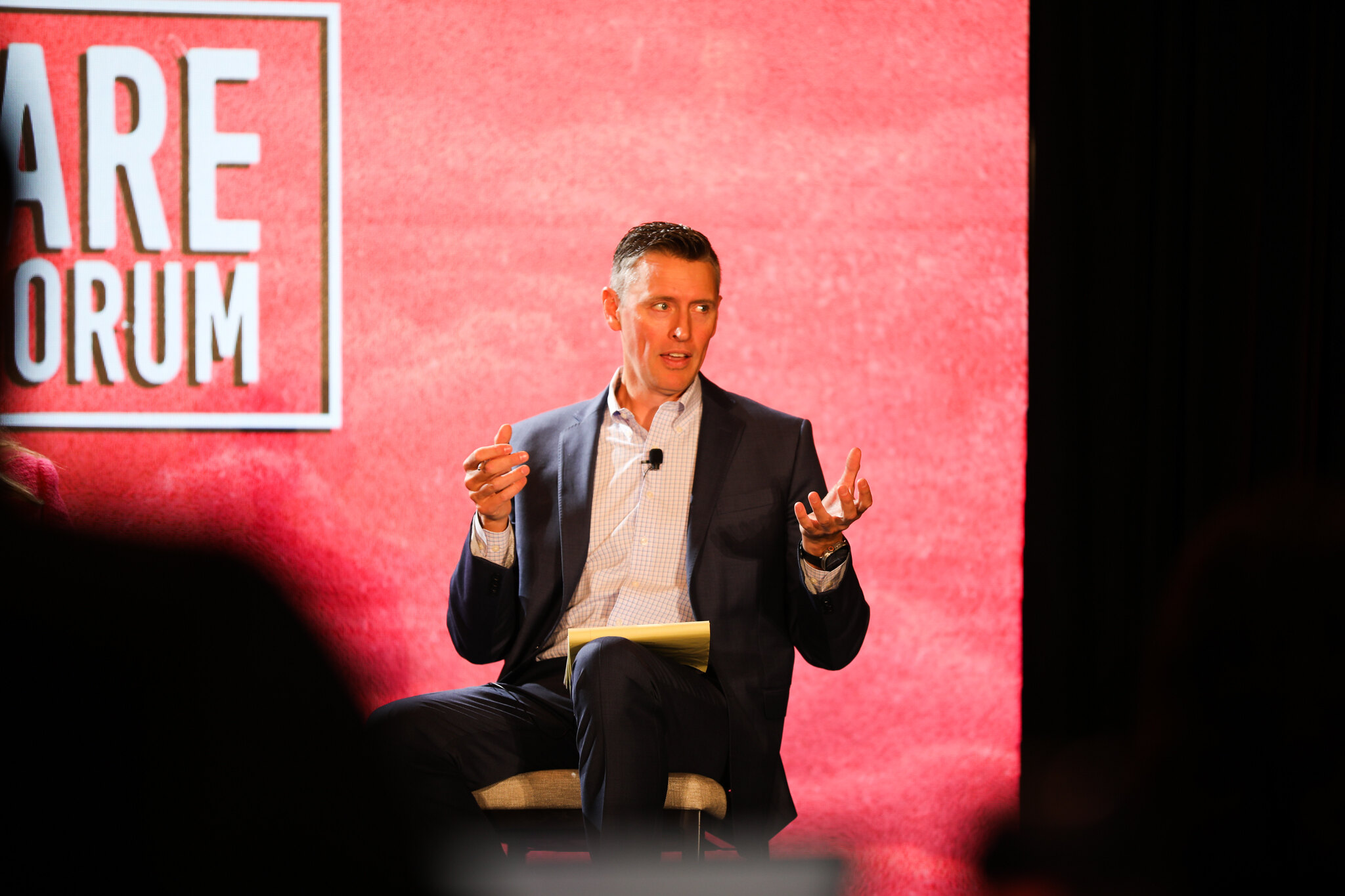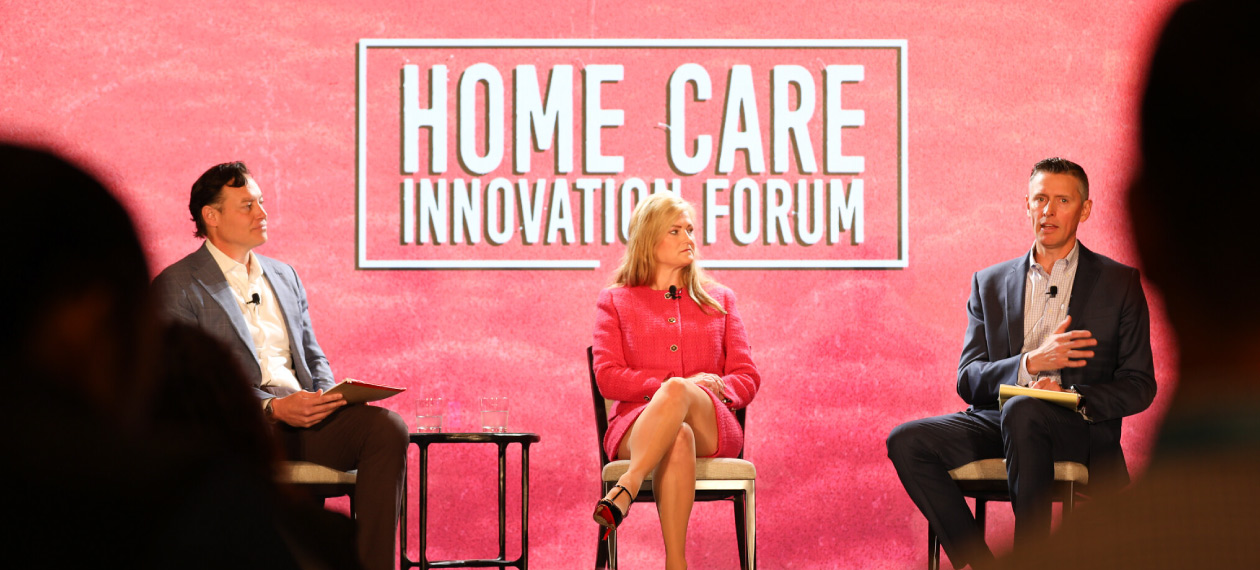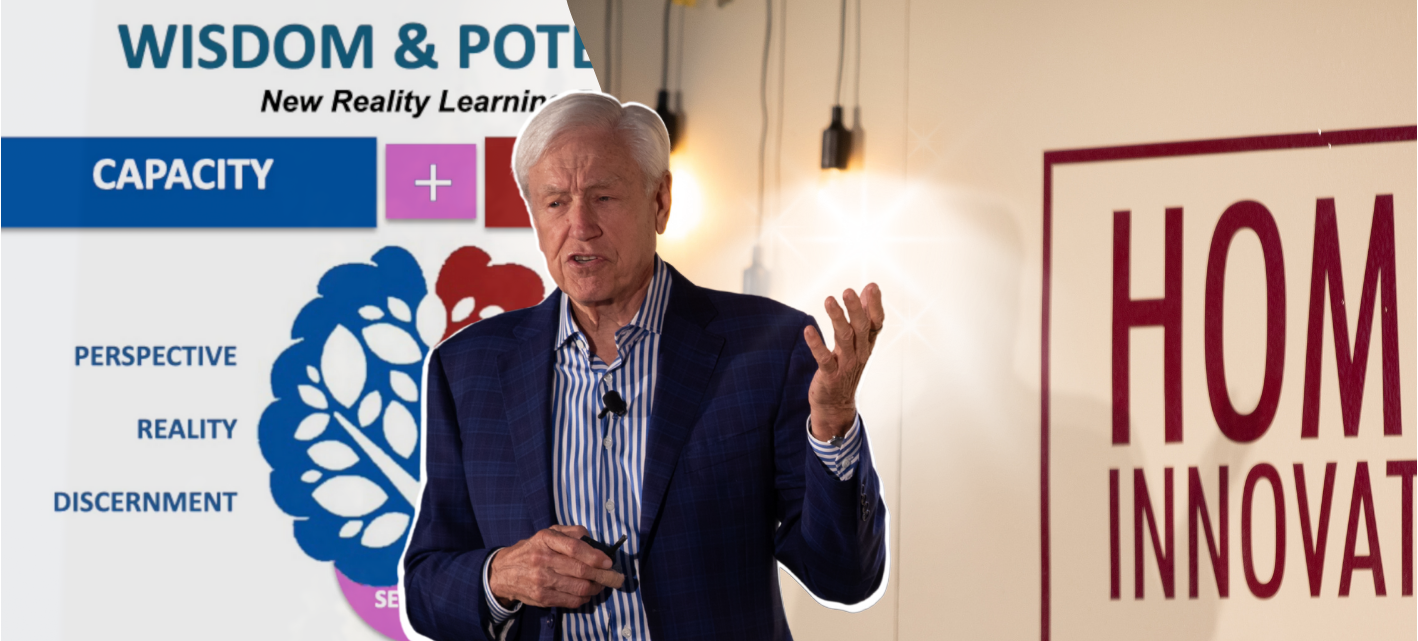In 2020, just over 200 Medicare Advantage plans offered in-home support services. In 2023, that number is swiftly approaching 1,100. While MA’s rapid growth certainly comes with its share of controversies, it also offers unmistakeable opportunities. To leverage these opportunities, however, home health and private pay providers may need to drastically rethink, well, everything.
In an illuminating discussion at the Home Care Innovation Forum in San Diego, three industry veterans put their heads together to unpack what it takes to deliver high-quality care to MA patients without sacrificing on the margins.
Moderated by Angelo Spinola, Home Health, Home Care & Hospice Chair at Polsinelli, the panel included Shelly Sun, Founder and CEO of BrightStar Care — which has served over 3,300 MA enrollees across 31 states — and Brent Korte, CEO of Frontpoint Health.
An Endangered Species
Korte offered some chilling words of warning for organizations continuing to build their models around traditional Medicare patients, no matter how sophisticated and effective those models may be.
"Everyone's getting very good at something that's not going to even be around in 10 years," he said. "Medicare is an endangered species, from a payer perspective.”
Frontpoint’s vision for the future — one in which MA dominates the market — revolves around more flexible models that offer caregivers and clinicians better pay, in turn providing patients with better services.
“Episodic care allows for a lot of extemporization,” he said. “When you say 'You can only have six visits and you still need to get to this point,' it forces efficiency. Artificial economics, they force efficiency in a different way. We've gotta figure out how to do that — to do more with less.”
Shifting the emphasis to MA isn’t just a wise move, Sun added, but a necessity. When BrightStar surveyed 2,000 consumers enrolled in MA plans that offered supplemental and home support hours, the majority said they’d only stick with a home care agency that accepted their MA benefits.
“That’s really what is gonna transform the industry,” she said.
This overwhelming consumer preference has wide-reaching implications. For one thing, providers (like BrightStar) that rely on salespeople to call hospitals in search of recent discharges will be able to slash that expense from their books.
“Medicare Advantage, theoretically, is your client acquisition,” Sun said. “I now am not having to pay to have a salesperson go get this client. I'm having the client come to me, and I'm at least getting rates adequate enough to cover the rates that I'm paying my caregiver.”
At the same time, MA-focused providers will likely need to pursue a more flexible workforce. That’s because MA patients tend to require shorter shifts, meaning they’re not a great fit for caregivers looking to work full-time with a single agency.
“You’re probably more looking for those that are retired and just want 15, 20 hours a week, or those who want to align their hours around when their kids are in school,” Sun explained. “We have found great success maneuvering with Medicare Advantage enrollees around the times of the day that we have people.”
Playing the Long Game
Both panelists were adamant that MA promises a profitable future for providers and better outcomes for patients. Still, Sun stressed that it may take some investment to build that future. If she hadn’t been willing to accept sub-par rates for a few years, she said, she probably wouldn’t have been able to gather enough data to demonstrate that two to five percent of MA clients will convert to private pay after two years.
“I think it’d be very difficult to do if I were PE-backed,” Sun said, reflecting on the importance of showing her franchisees that she’s willing to put her money where her mouth is. “We've invested those monies over the last few years to learn more, and now we're able to share that with our franchisees. From what we've learned in our company-owned footprint, we now are moving out to more states. We do Medicare Advantage in 31 states on a monthly basis.”
Another roadblock lies with insurance companies who don’t yet recognize the potential of home care, with the majority of their institutional knowledge — not to mention money — still focused on hospitals, primary care, and pharmaceuticals.
“What that translates to is, ‘Hey, we'll pay you, Frontpoint, $120 a visit,’ and to me that's maddening,” Korte said. “They could double that amount and the ROI is absolutely there: $240 a visit and we'll keep their patients home. We'll probably do a better job, ‘cause we're gonna be able to hire better people. It's confounding that insurers aren't understanding it.”
Scaling Up
What tools do providers need to move the needle when renegotiating rates with insurance companies? “Stars and scale,” Korte said, lamenting that star ratings often lag frustratingly behind actual patient satisfaction — placing the onus on providers to maintain and show data that speaks to the present reality. As for scale, the equation is straightforward:
“The more scale we can provide, the more Medicare Advantage patients we can take, the more we're going to be able to sit at the table and be able to push on rates,” he explained.
Providers may have to deal with slightly-better-than-breakeven rates as they gather the data to convince insurers they’re worth more. In the meantime, they can also focus on being a good partner.
“What we judge ourselves on is our fulfillment rate,” Sun said. “When we're dealing with the plans, that's an important thing for them: if they give us 10 referrals, do we take six out of the 10 or do we take two out of the 10? ‘Cause if we're only taking two out of the 10, we're not that helpful, we're not really a partner.”
Giving Seniors the Care They Deserve
If Korte and Sun were blunt about the time, money, and complexity involved in building a successful home care model for MA patients, they were just as unwavering in their belief that this is the best path forward, for providers and patients alike.
“Our seniors deserve great care in the home,” Sun said. “Medicare Advantage plans are innovative enough to recognize that in-home support services are probably the best way to do that and bend the cost curve — particularly for more complex patients with multiple comorbidities. We can be a part of that solution.”

Posted by
Join us!
The retreat for home health care and hospice leaders innovators.
May 17-19, 2026 | Palm Springs, CA




-2.png)


-2.png)


Comments